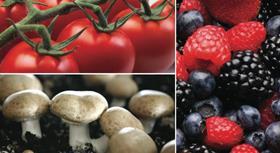
An outstanding performance form Costa Group’s citrus business has helped the leading Australian fresh produce company offset “a materially lower than expected contribution” from its Moroccan berry operation over the 2018 finical year (ended 1 July 2018).
The group posted revenue of A$1,002m over the 12-month period (FY2018). The produce segment delivered revenue growth of 7.3 per cent on FY2017 for a total of A$843.3m. Total transacted sales from the segment were A$1,180m, compared to A $1,028m in FY2017, a 14.8 per cent increase.
A cold Northern Hemisphere spring and early summer period delayed berry production at Costa’s two offshore operations in China and Morocco. The Morocco harvest was most significantly affected, with the crop delayed by up to eight weeks. The overall yield out of Morocco was around 10 per cent below expectations, resulting in a “higher proportion of lower grade product,” according to a statement issued to shareholders via the Australian Securities Exchange.
The overall performance in China was in line with expectations, with Costa’s second blueberry harvest in the Asian nation returning a modest profit. The company said its development plans in China are progressing well, with a total of 100ha planted across three farms at the end of FY2018. A further 65ha is to be planted in 2019, the majority of which will be blueberries.
On the domestic front, Costa’s berry expansion programme was completed to plan in FY2018, with an additional 97ha planted. The FY2019 planting programme will see an extra 45ha planted, which includes blackberries in Tasmania and Far North Queensland.
Australian blueberry production during FY2018 was impacted by lower yields, the result of pest pressure in Far North Queensland towards the end of 2017. Significant volumes of Costa’s premium Arana blueberry variety are expected to be harvested later this year.
Citrus leads the way
The citrus category was the standout performer in Costa’s FY2018 results. A late start to the 2017 calendar year citrus season and early start to the 2018 season, coupled with excellent fruit quality and strong export demand, drove the strong performance.
Around 75 per cent of Costa’s citrus product is being exported, with Japan, the US and China key markets, while the company continues to develop its programmes into Korea on the back of tariff reductions.
Costa’s 2018 calendar citrus season is forecasted to produce 80,000 tonnes, a 20 per cent reduction on the prior season.
Growing avocado ascendency
Costa’s work to position avocados as it fifth vertically integrated core produce category continues to gain momentum, with its production window now spanning February to December.
The company has acquired six avocado operations over the last 18 months, with three core production and packing hubs in Far North Queensland, Central Queensland and Northern New South Wales. This is supplemented by 100ha of avocado plantings on Costa’s Riverland citrus orchards.
Once in full maturity, Costa’s avocado orchards are expected to yield 2m trays, with an additional third-party volume of approximately 2.6m trays per annum.
Volumes from its farms in Central Queensland were circa 20 per cent below expectations in 2017/18, while volumes from its Atherton farms in Far North Queensland were 20 per cent above expectations.
“Pricing for most of the year was strong primarily due to low industry volumes from the Central QLD, West Australia and New Zealand seasons,” the release said.
Mushroom facility nears completion
The company continues to make headway with its Monarto, South Australia, mushroom farm expansion project. Announced in February 2017, the A$71m project will boost production capacity from 120 tonnes per week to 240 tonnes per week once complete.
“Encouragingly, mushroom industry demand remains positive with value growth of 6.3 per cent per annum,” the company said.
It was another solid year from Costa’s tomato category, with the performance driven by continuing improvement from its new 10ha glasshouse, with the yield from this facility again exceeding expectations.
The group’s truss plantings have now been reduced to 25 per cent of its total planted tomato area, the result of a greater focus on the snacking and cocktail segments.
At boardroom level, Costa has also announced Tiffany Fuller has resigned as a non-executive director of the company, effective 1 September 2018. Tim Goldsmith, currently president and CEO of mining company Rincon, will assume Fuller’s position on the board.



